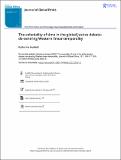Files in this item
The coloniality of time in the global justice debate : de-centring Western linear temporality
Item metadata
| dc.contributor.author | Hunfeld, Katharina | |
| dc.date.accessioned | 2022-06-02T15:30:06Z | |
| dc.date.available | 2022-06-02T15:30:06Z | |
| dc.date.issued | 2022-06-02 | |
| dc.identifier | 278276981 | |
| dc.identifier | d6fda889-38e8-4efe-afca-f8e54f7f0fa9 | |
| dc.identifier | 85131318950 | |
| dc.identifier.citation | Hunfeld , K 2022 , ' The coloniality of time in the global justice debate : de-centring Western linear temporality ' , Journal of Global Ethics , vol. 18 , no. 1 , pp. 100-117 . https://doi.org/10.1080/17449626.2022.2052151 | en |
| dc.identifier.issn | 1744-9626 | |
| dc.identifier.uri | https://hdl.handle.net/10023/25487 | |
| dc.description.abstract | Differences between, and struggles over, plural forms of time and temporal categories is a crucial yet underexplored aspect of debates about global justice. This article aims to reorient the global justice debate towards the question of time by, first of all, critically problematising the coloniality of the Western temporal assumptions underlying the literature, and furthermore by stressing the need to account for the plurality of time. I argue that in the global justice debate, the implicitly racialised teleological narrative of linear time is particularly prevalent in the discourse on development as well as the debate on historical injustices. In order to avoid the epistemic violence resulting from the uncritical acceptance of Western temporal frameworks as universally valid, global normative theorising needs to move reflections on time to the centre of their considerations. This article suggests that relational theory offers pertinent resources for making sense of alternative ways of narrating, conceptualising, and experiencing temporality. The article encourages a conversation between Western and non-Western relational approaches, proposing the temporal dimension of feminist as well as African ubuntu thought as particularly promising starting points for contesting the epistemological privilege of analytic approaches dominating the global justice literature. | |
| dc.format.extent | 18 | |
| dc.format.extent | 1776946 | |
| dc.language.iso | eng | |
| dc.relation.ispartof | Journal of Global Ethics | en |
| dc.subject | Time and temporality | en |
| dc.subject | Global justice | en |
| dc.subject | Coloniality | en |
| dc.subject | Relational theory | en |
| dc.subject | Feminist relational theory | en |
| dc.subject | African ubuntu thought | en |
| dc.subject | JV Colonies and colonization. Emigration and immigration. International migration | en |
| dc.subject | JZ International relations | en |
| dc.subject | T-NDAS | en |
| dc.subject | SDG 10 - Reduced Inequalities | en |
| dc.subject | SDG 16 - Peace, Justice and Strong Institutions | en |
| dc.subject | NIS | en |
| dc.subject.lcc | JV | en |
| dc.subject.lcc | JZ | en |
| dc.title | The coloniality of time in the global justice debate : de-centring Western linear temporality | en |
| dc.type | Journal article | en |
| dc.contributor.institution | University of St Andrews. School of International Relations | en |
| dc.identifier.doi | https://doi.org/10.1080/17449626.2022.2052151 | |
| dc.description.status | Peer reviewed | en |
This item appears in the following Collection(s)
Items in the St Andrews Research Repository are protected by copyright, with all rights reserved, unless otherwise indicated.

